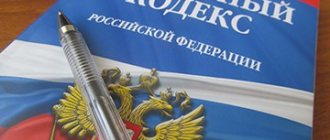Definition of the concept of “close relatives” according to the legislation of the Russian Federation
Who does the law define as close relatives? It’s logical to start searching for an answer to the question with the Family Code. There is no separate article defining the concept in the normative act. Listing the circle of persons with whom it is prohibited to marry, Article 14 of the code defines the term “close relatives”.
RF IC, Article 14. Circumstances preventing marriage
“It is not permitted to enter into marriage between:
close relatives (relatives in a direct ascending and descending line (parents and children, grandfather, grandmother and grandchildren), full and not full (having a common father or mother) brothers and sisters)..."
Family Code of the Russian Federation dated December 29, 1995 N 223-FZ (as amended on December 30, 2015)
The content of the concept of “close relatives” is disclosed in the Family Code of the Russian Federation
The Civil Code agrees with this definition. Article 37 states:
Civil Code of the Russian Federation Article 37. Disposal of the property of a ward
The guardian, trustee, their spouses and close relatives do not have the right to enter into transactions with the ward, with the exception of the transfer of property to the ward as a gift or for free use, as well as to represent the ward when concluding transactions or conducting legal cases between the ward and the spouse of the guardian or trustee and their relatives relatives.
Civil Code of the Russian Federation (Civil Code of the Russian Federation)
Civil Code of the Russian Federation, Part 1, adopted on October 24, 1994, No. 51-FZ
Kinship terminology
Some terms, such as son-in-law and daughter-in-law, are ambiguous. This system is somewhat asymmetrical: a sister-in-law’s husband is a brother-in-law, a brother-in-law’s wife is a daughter-in-law, but a brother-in-law’s wife and a sister-in-law’s husband are not called anything at all. In this system of family ties there is no regularity, “algebraicity”, which is observed in terms of the consanguineous system, where kinship relations are expressed by adding “great” and “cousin”. In order to more fully present the picture of the Russian kinship system, it is necessary to present another system of current terms - those associated with remarriage. In this system, the first two terms are the result of “my” remarriage, the rest are the result of my parents’ marriage:
Who is legally included in the circle of close relatives
Kinship between people in sociology is defined as relationships arising from consanguinity or marriage.
In private law, close relatives are blood relatives in ascending and descending lines who have a common ancestor. Spouses are not close relatives. Relationships of property arise between them, developing on the basis of marriage. In-laws are also mother-in-law, mother-in-law, father-in-law, and father-in-law.
The family relationship pattern can include a wide range of people, but not everyone is considered close relatives
Close relatives and family members according to the Family Code (FC)
The Family Code of the Russian Federation introduces the concept of “family members” and defines the circle of persons related to them.
RF IC, Article 2. Relations regulated by family law
Family legislation establishes the procedure for the exercise and protection of family rights, the conditions and procedure for marriage, termination of marriage and recognition of its invalidity, regulates personal non-property and property relations between family members: spouses, parents and children (adoptive parents and adopted children), and in cases within the limits provided for by family legislation, between other relatives and other persons, determines the procedure for identifying children left without parental care, the forms and procedure for their placement in a family, as well as their temporary placement, including in an organization for orphans and children left behind without parental care.
Family Code of the Russian Federation dated December 29, 1995 N 223-FZ (as amended on December 30, 2015)
The article of the law states that the code considers one type of family characteristic of modern society. This is a nuclear (partner) family. Its basis is not the blood connection between generations of relatives, but the relationship between spouses. To paraphrase a famous slogan, this type of family can be defined as follows: “Mom, dad and I - a nuclear family.” Grandparents are not included in the family because their children have grown up and lost their child status. Article 54 of the Family Code explains who are considered children by law.
RF IC, Article 54. The right of a child to live and be raised in a family
- A child is a person who has not reached the age of eighteen years (the age of majority).
Family Code of the Russian Federation dated December 29, 1995 No. 223-FZ (as amended on December 30, 2015)
Family members are considered to be spouses and their minor children
Family members are husband, wife and their children or adoptive parents and adopted child. Grandparents remain close relatives.
Interpretation of marriage and family law
According to marriage and family law, a family member can be a person who is a relative of a certain person. necessary to have common ancestors with this person .
These could be grandparents. In this case, it is not necessary to live with a certain person, for example, the owner of a residential premises, in the same residential premises.
This type of legislation may also include adopted children and children taken into foster care. Although adopted children do not have common ancestors and relatives, they are still family members in accordance with special documents for adoption and guardianship.
Close relative status
Each legal concept implies a legal status and entails rights, and sometimes obligations, defined by law. This also applies to close relatives.
Family ties: is it possible to get married?
The list of close relatives with whom you cannot marry, according to the Family Code, is complete. Russian law is more liberal on this issue than the laws of many Western democracies. In Russia, marriages are allowed between first and second cousins, uncle and niece, aunt and nephew. In the Russian Empire, a ban on marriages of close relatives existed up to the fourth degree of relationship. The French Civil Code prohibits marriages between uncle and niece, aunt and nephew. In Ukraine, marriage between first cousins is not allowed.
What does establishing the fact of family relations between spouses lead to?
If it turns out that there is a closely related relationship between the spouses, this will entail legal consequences. To confirm this fact, it is necessary to collect evidence and present it to the court. The court, relying on Article 14 of the Family Code, will make a decision to declare the marriage union invalid.
Video: why marriage between brother and sister is prohibited
https://youtube.com/watch?v=SqIlsMpZahA
What rights does the status of a close relative give in the event of a person’s death?
The death of a loved one is not only a personal grief. Relatives enter into inheritance rights and must take care of the funeral. In this situation, the state provides assistance to relatives in various forms:
- Funeral benefits are paid regardless of the degree of relationship. Relatives of a serviceman receive benefits at the military registration and enlistment office, a pensioner - at the branch of the pension fund, and a former employee at the employer. Other citizens apply to the department of social protection of the population at their place of residence.
- A 5-day leave is provided for the funeral of a close relative.
- The state pays a survivor's pension.
- Receipt of unpaid pensions and salaries is guaranteed, including compensation for unpaid vacation. Payments are made for actual time worked. The limitation period in labor law is six months. During this period, you must contact your employer for payments.
There are several types of survivors' pensions:
- the insurance pension is paid to family members of the deceased who are disabled dependents;
- a state pension is assigned to disabled family members of a deceased serviceman;
- The social pension is awarded to children under the age of 18 and to child students who continue to study full-time until they reach 23 years of age.
Close relatives of the deceased have the right to financial assistance from the state
Military family members
The Law of the Russian Federation “On the Status of Military Personnel” does not use the concept of “close relative”, but only refers to family members of a serviceman. Article two of the law contains a complete list of persons related to them. The list complies with family law.
Article 2. Citizens with military status
- Family members of military personnel and citizens discharged from military service who are subject to the specified social guarantees and compensation, unless otherwise established by this Federal Law and other federal laws, include: spouse;
minor children;
children over 18 years of age who became disabled before they reached the age of 18;
children under the age of 23 studying full-time in educational institutions;
dependent persons of military personnel.
Social guarantees and compensation provided for by this Federal Law and federal laws for military personnel and members of their families may be extended to other persons and members of their families by decrees of the President of the Russian Federation.
Federal Law of May 27, 1998 “On the Status of Military Personnel” No. 76-FZ (as amended on March 21, 2011)
According to the law, the parents of a serviceman do not receive social benefits. This situation contradicts our cultural traditions, which go back to the recent Soviet past. Children were financially supported by their parents throughout their adult lives. Due to economic reasons, several generations of relatives had to live in the same family. For many people, excluding the parents of a military member from the list seems unfair.
Social benefits and payments apply only to family members of a military personnel
In difficult situations, parental dependency should be formalized by law. This is done by submitting a report to the command. The military service record will include the provision of dependent parents. To avoid misunderstandings, you should consult with a military lawyer.
You can find out about benefits for family members of military personnel on the official websites of government authorities. Many social guarantees are provided by regulations or specified by them.
Who can be a family member?
Citizens who are not considered relatives of the owner of the premises can also be defined as family members. This is observed when they live in one place and are settled there by the owner of the property.
It is also important that a person not only lives in the premises, but also has some relationship with the owner and other people living with him in the same living space.
Family members have relationships with each other based on mutual respect, mutual care, non-property and property rights. Their economy, as already mentioned, should be common. Rarely are family members people who are not officially considered relatives.
How to determine the degree of relationship
In family law, great importance is attached to consanguinity, which is the basis for the emergence of relations between parents and children. But only alimony obligations can arise between other close relatives. For example, the child is supported by the grandmother, since the parents are not able to make payments. Accordingly, the degree of kinship recognizes the connection through birth. That is why the count of degrees is determined by the number of births separating one relative from another. For example, there is 1 birth between father and son, respectively, 1st degree of relationship .
02 Jan 2021 marketur 302
Share this post
- Related Posts
- Where to go if a person goes missing in Cuba
- What needs to be done to restore a lost student transport card
- Housing and communal services Contents F
- Cost of a medical examination upon hiring
Family ties: who is related to whom
Grandma, grandma
- mother of the father or mother, grandfather's wife
Brother
- son in relation to other children of the same parents
Godbrother
- son of the godfather Cross
brother, cross brother, named brother
- persons who exchanged pectoral crosses
Bro, brother
- cousin
Bratanich
- brother's nephew
Bratanikha
- cousin's wife
Bratanna
- brother's daughter, brother's niece
Bratelnitsa
- cousin or distant relative
Bratova
- brother's wife
Bratych
- brother's son, brother's nephew
Homogeneous (half-blooded)
- descended from the same father
Single-uterine (half-uterine)
- descended from the same mother
Father
- a man in relation to his children
Godfather
- the successor at the baptismal rite
Named father
- the father of the adopted child, the pupil
The father of the adopted, planted, mummer
- a man who replaces the groom's own father at the wedding
Stepfather
- a stepfather, another husband of the mother in relation to her children from previous marriage
Father
- the eldest in the generation
Father, stepfather
- son, heir
Please note => Which OS group does the presentation table belong to?









